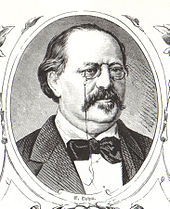Ernst Dohm
Wilhelm Ernst Dohm (born Elias Levy ; * May 24, 1819 in Breslau ; † February 5, 1883 in Berlin ) was a German editor, writer and translator.
life and work
Dohm, who was of Jewish descent, was born in Breslau in 1819 as the son of a merchant. His family was baptized in 1828 and took the name Dohm, Elias was given the new first name Ernst. Ernst Dohm studied theology and philosophy at the University of Halle , among others with August Tholuck . After a brief activity as a pastor, he worked as a literary critic for various newspapers, including Der Gesellschafter or Blätter für Geist und Herz (published by Friedrich Wilhelm Gubitz ) and the magazine for foreign literature . When the Kladderadatsch , a political-satirical magazine, was founded in the revolutionary year of 1848 , Dohm was one of the first employees. He developed a special talent for political satire, mostly clad in rhymes, and was appointed editor-in-chief in 1849, one year after the magazine was founded.
Under Dohm's direction, the Kladderadatsch developed into one of the most important satirical magazines in Germany, which also increasingly influenced the formation of public opinion. So the magazine fueled an aversion to the French Emperor Napoléon III. who finally declared war on Prussia on July 19, 1870 . In the 1860s, Dohm gave his magazine an increasingly national liberal-conservative tendency, which was expressed, among other things, in a positive assessment of Reich Chancellor Otto von Bismarck and a criticism of the emerging social democracy. Bismarck's protectionist economic policy, which emerged around 1879, was also viewed critically.

The coinage of the pun is also attributed to him. Dohm spent several vacation stays in the small town of Calau in southern Brandenburg and published the sometimes crude puns of the shoemakers under the heading “Reports from Kalau”. Since 2011, a joke trail in the city has led, among other things, to a memorial plaque to commemorate his visits to the city and his services to the joke.
In addition to his work for the Kladderadatsch , Dohm published several independent works. In 1849, The Incitator in the West Pocket , a collection of satires, appeared. The Trojan War followed in 1864 , in which Dohm satirically portrayed society and politics in 1850. Dohm also emerged as a translator. He translated several fables by the French writer Jean de La Fontaine (1621–1695) as well as libretti for operettas by the composer Jacques Offenbach , also from the French.
In 1853 Dohm married the writer and women's rights activist Hedwig Schlesinger , with whom he had five children: Hans Ernst Dohm (1854–1866); Hedwig Dohm (1855–1942), who married the mathematician Alfred Pringsheim , Ida Marie Elisabeth Dohm (* 1856, married Rosenberg), Marie Pauline Adelheid Dohm (* 1858, married Gagliardi) and Eva Dohm (* 1860, married Klein, married Bondi ). Through his daughter Hedwig, he was the grandfather of Katharina "Katia" Pringsheim , Thomas Mann's wife ; he died shortly before she was born. Together with his wife, Ernst Dohm built a literature salon on Potsdamer Strasse in Berlin. The meetings, which have taken place on Mondays since the mid-1870s, were particularly appreciated because of the popular, humorous host. Among others, Ferdinand Lassalle , Fanny Lewald , Franz Liszt and his daughter Cosima Wagner frequented the place . After Dohm's death, the salon was continued by his wife.
Ernst Dohm died in Berlin in 1883 at the age of 63. Like his wife later, he found his final resting place in the Old St. Matthew Cemetery in Schöneberg . His grave has not been preserved.
literature
- Heinz August: Dohm, Wilhelm Ernst. In: New German Biography (NDB). Volume 4, Duncker & Humblot, Berlin 1959, ISBN 3-428-00185-0 , p. 40 f. ( Digitized version ).
- Cornelia Lutz: Dohm, (Wilhelm) Ernst . In: Walther Killy (Ed.): Literaturlexikon. Authors and works in German . Bertelsmann-Lexikon-Verlag, CD-Rom Berlin 1998, Vol. 3, pp. 97-98.
- Max Osborn : Dohm, Ernst . In: Allgemeine Deutsche Biographie (ADB). Volume 48, Duncker & Humblot, Leipzig 1904, pp. 219-224. (Tendentious biography that Dohm praises to heaven.)
- Isabel Rohner: Traces into the now. Hedwig Dohm - a biography . Ulrike Helmer Verlag, Sulzbach im Taunus 2010, ISBN 978-3-89741-299-6 , especially pp. 49-61.
Web links
- Literature by and about Ernst Dohm in the catalog of the German National Library
- Works by and about Ernst Dohm in the German Digital Library
- Short biography and information on the work of Ernst Dohm at Literaturport
- Edda Dammmüller: May 24th, 1819 - birthday of Ernst Dohm WDR ZeitZeichen on May 24th, 2014. (Podcast)
Remarks
- ↑ See Martina Löw, Bettina Mathes (ed.), Key Works of Gender Research , VS Verlag für Sozialwissenschaften 2005, p. 16 with note 7.
- ↑ On the formation of opinion by Dohm and the Kladderadatsch , also with regard to Napoléon III, cf. Osborn, in: ADB, Vol. 48, p. 222.
- ↑ City of Calau (ed.): Living together in Calau ... perfectly healthy city with wit, information for residents . P. 34, brochure, without date
- ↑ On this, Petra Wilhelmy, The Berlin Salon in the 19th Century (1780-1914) , Walter de Gruyter, Berlin 1989, ISBN 3-11-011891-2 , p. 634.
- ^ Hans-Jürgen Mende: Lexicon of Berlin tombs . Haude & Spener, Berlin 2006, p. 301.
| personal data | |
|---|---|
| SURNAME | Dohm, Ernst |
| ALTERNATIVE NAMES | Levy, Elias |
| BRIEF DESCRIPTION | German editor, writer and translator |
| DATE OF BIRTH | May 24, 1819 |
| PLACE OF BIRTH | Wroclaw |
| DATE OF DEATH | February 5, 1883 |
| Place of death | Berlin |


